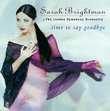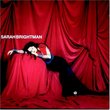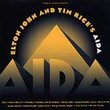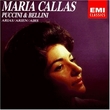| All Artists: John Noble, Matteo Manuguerra, Renato Capecchi, Sherrill Milnes, Giacomo Puccini, James Levine, National Philharmonic Orchestra, Carol Neblett, Renata Scotto, Alfredo Kraus, Paul Crook Title: Puccini: La Bohème Members Wishing: 0 Total Copies: 0 Label: EMI Classics Release Date: 7/10/2006 Genre: Classical Styles: Opera & Classical Vocal, Symphonies Number of Discs: 2 SwapaCD Credits: 2 UPC: 094636771526 |
Search - John Noble, Matteo Manuguerra, Renato Capecchi :: Puccini: La Bohème
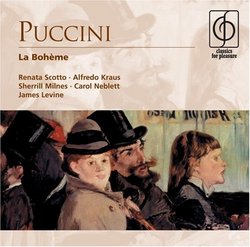 | John Noble, Matteo Manuguerra, Renato Capecchi Puccini: La Bohème Genre: Classical
No Description Available. Genre: Classical Music Media Format: Compact Disk Rating: Release Date: 23-JAN-2007 |
Larger Image |
CD DetailsSynopsis
Product Description No Description Available. Genre: Classical Music Media Format: Compact Disk Rating: Release Date: 23-JAN-2007 Similarly Requested CDs
|
CD ReviewsLevine underplays the emotion, but evryone is in top form Santa Fe Listener | Santa Fe, NM USA | 03/26/2008 (4 out of 5 stars) "There's no reason for this to be an unsung La Boheme, yet EMI has let it kick around mostly in highlights without much notice. The recording dates from 1980, at a time when all the major classical labels seemed to be using the so-called National Philharmonic, in actuality a pick-up band of London free lances. They were a good group, and James Levine made fine use of them, mostly for RCA. I imagine he drifted over to EMI following Renata Scotto, who reigned supreme at the Met and had a close tie to him.
One can't fault Levine here -- he offers alert leadership with lots of tender discretion where it's called for. He risks underplaying a famous tearjerker to give it more dignity. As for the singers, Kraus was a born Rodolfo, and his gleaming lyric tenor wraps itself naturally, if a bit coolly, around Puccini's lines. Scotto is Scotto, dramatically astute and intense but with a voice that can become shrill and wayward under pressure. The two leads make a convincing romantic pair, with one caveat: neither sounds innocent or shy. I'd call them assured, even knowing, which gives a slightly off color to their charactrizations compared with the sentimental, coltish lovers one usually imagines. Milnes is caught in best voice as Marcello, and thankfully he doesn't bellow or become overbeating. Carol Neblett's Musetta is accurate and well sung, but she's not sexy or fun in the cafe scene. Indeed, the prevailing fault in this performance is that it tneds to be rather grave, and Levine gets a case of the slows here and there (as in the Act I love duet), a habit that pays expressive dividends in the opera house but less so on records. EMI's recorded sound is fine, with any digital shrillness being tamed on top. In the end, only the somewhat reserved singing and conducting keep me from rating this Boheme higher -- one must acknowledge how stiff the competition is." |

 Track Listings (22) - Disc #1
Track Listings (22) - Disc #1


